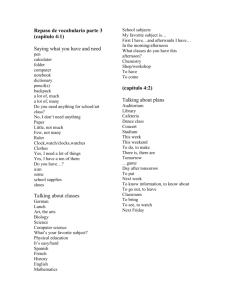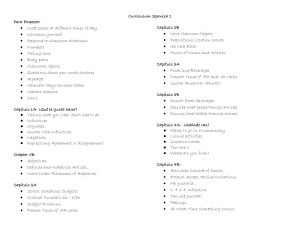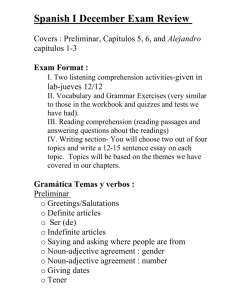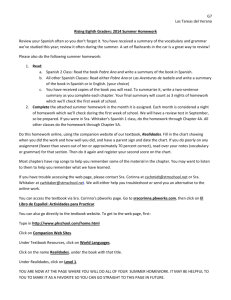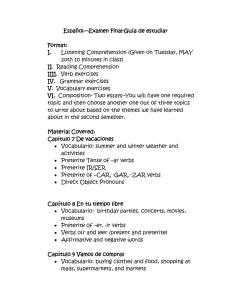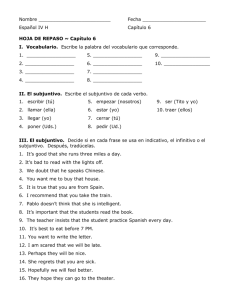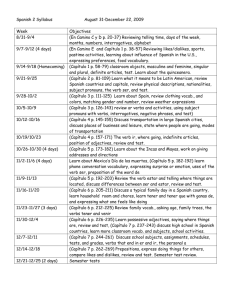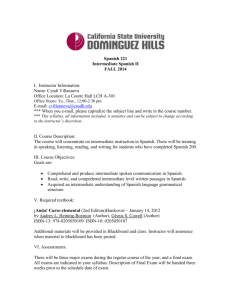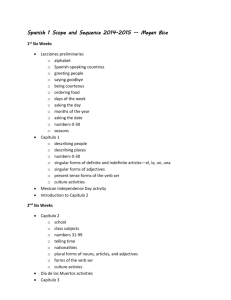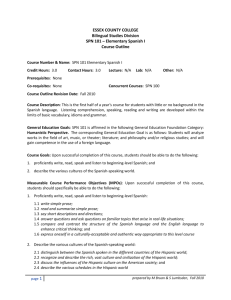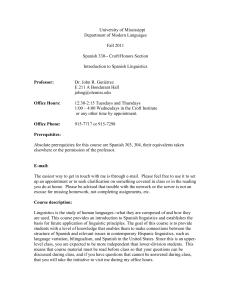SPAN 2020 Intermediate Spanish II
advertisement
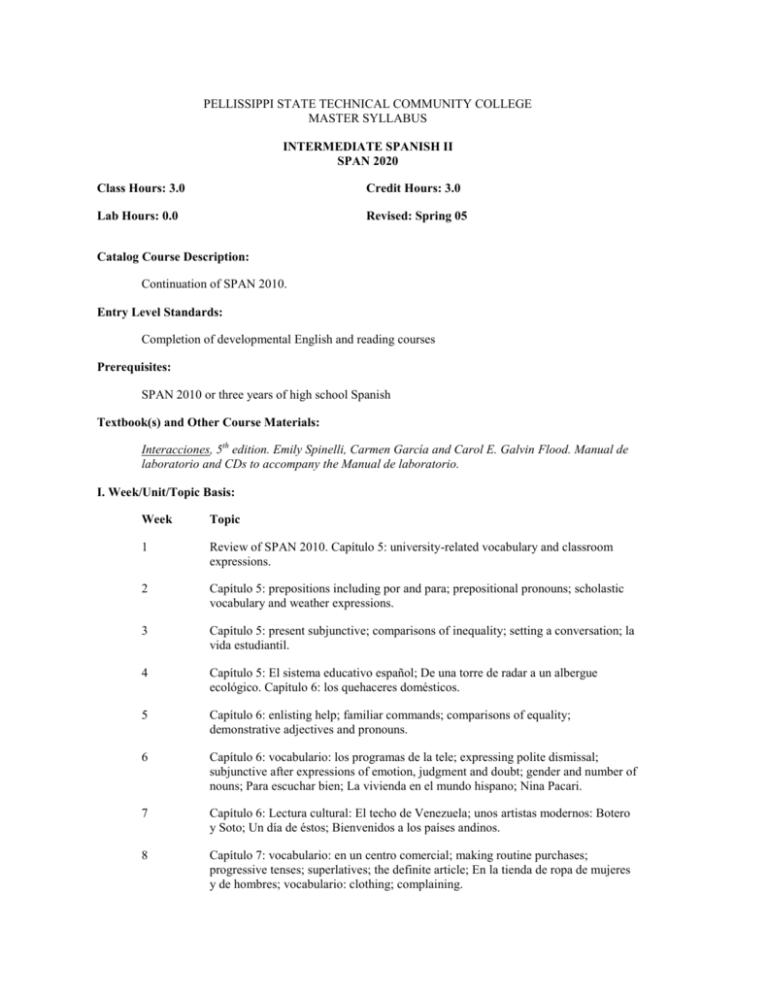
PELLISSIPPI STATE TECHNICAL COMMUNITY COLLEGE MASTER SYLLABUS INTERMEDIATE SPANISH II SPAN 2020 Class Hours: 3.0 Credit Hours: 3.0 Lab Hours: 0.0 Revised: Spring 05 Catalog Course Description: Continuation of SPAN 2010. Entry Level Standards: Completion of developmental English and reading courses Prerequisites: SPAN 2010 or three years of high school Spanish Textbook(s) and Other Course Materials: Interacciones, 5th edition. Emily Spinelli, Carmen García and Carol E. Galvin Flood. Manual de laboratorio and CDs to accompany the Manual de laboratorio. I. Week/Unit/Topic Basis: Week Topic 1 Review of SPAN 2010. Capítulo 5: university-related vocabulary and classroom expressions. 2 Capítulo 5: prepositions including por and para; prepositional pronouns; scholastic vocabulary and weather expressions. 3 Capítulo 5: present subjunctive; comparisons of inequality; setting a conversation; la vida estudiantil. 4 Capítulo 5: El sistema educativo español; De una torre de radar a un albergue ecológico. Capítulo 6: los quehaceres domésticos. 5 Capítulo 6: enlisting help; familiar commands; comparisons of equality; demonstrative adjectives and pronouns. 6 Capítulo 6: vocabulario: los programas de la tele; expressing polite dismissal; subjunctive after expressions of emotion, judgment and doubt; gender and number of nouns; Para escuchar bien; La vivienda en el mundo hispano; Nina Pacari. 7 Capítulo 6: Lectura cultural: El techo de Venezuela; unos artistas modernos: Botero y Soto; Un día de éstos; Bienvenidos a los países andinos. 8 Capítulo 7: vocabulario: en un centro comercial; making routine purchases; progressive tenses; superlatives; the definite article; En la tienda de ropa de mujeres y de hombres; vocabulario: clothing; complaining. 9 Capítulo 7: indefinite and negative expressions; double object pronouns; making inferences; De compras en el mundo hispano; De compras en Madrid. 10 Capítulo 7: Para leer bien; La guayabera; Para escribir bien (letters of complaint); Capítulo 8: vocabulario: city; asking for, understanding and giving directions. 11 Capítulo 8: formal commands; passive se; the indefinite article; vocabulario: tourist attractions 12 Capítulo 8: persuading; future tense; future of probability; nosotros commands; Para escuchar bien: Taking notes 13 Capítulo 8: Las ciudades hispanas; En la ciudad de Madrid; El retorno de los balcones de Lima; La arquitectura colonial del Perú. 14 Oral presentations in class and final exam review. 15 Final exam period II. Course Objectives*: A. Listening comprehension: understand progressively more challenging conversations and more complicated monologues. I.1 B. Speaking skills: participate in more challenging conversations, modify the memorized material to use in new situations, use a variety of tenses, speak about a variety of subjects. I.5 C. Reading comprehension: read and appreciate short literary pieces. I.1 D. Writing skills: use simple and complex sentences, accuracy of expression, variety in written style. I.3 E. Cultural sensitivity: react appropriately in common social situations, be aware of the cross-cultural differences, increase knowledge of the Hispanic contributions to art, literature, and music. IV *Roman numerals after course objectives reference TBR’s general education goals. III. Instructional Processes*: Students will: 1. Listen to questions and form logical and correct responses for those questions. Students will role play predetermined situations and respond to questions and comments of other role players. Students will listen to responses by other students and comment on the appropriateness of those responses for the situation. Communication Outcome, Active Learning Strategies 2. Read a variety of texts and extract appropriate information from each and formulate responses to questions about the text to include putting statements about the text in order, determining whether statements about the text are true or false and correcting false statements, commenting about the text with the instructor and classmates and selecting appropriate ways to complete statements about the text. Communication Outcome, Active Learning Strategies 3. Develop time management skills by completing assigned tasks within a designated amount of time. Communication Outcome 4. Develop and implement personalized methods for learning new vocabulary, grammatical constructions and communication strategies that will enable them to learn and retain material presented in class. Communication Outcome 5. Work together in paired activities as well as in small group activities to determine the most appropriate ways to complete communicative exercises. Communication Outcome, Active Learning Strategies 6. Read about and discuss aspects of culture that is an integrated part of the language and/or the region where the language is spoken. Communication Outcome, Humanities Outcome, Transitional Strategies 7. When appropriate, complete written homework using a word processor, taking care to use all punctuation and special characters unique to the language. Communication Outcome, Technological Literacy Outcome 8. Use computer tutorials that accompany the text when necessary. Communication Outcome, Technological Literacy Outcome 9. Use web based supplements that accompany the text when appropriate. Communication Outcome, Technological Literacy Outcome 10. Interpret data and draw conclusions about content from tables and graphs that are included as part of reading assignments. Communication Outcome *Strategies and outcomes listed after instructional processes reference TBR’s goals for strengthening general education knowledge and skills, connecting coursework to experiences beyond the classroom, and encouraging students to take active and responsible roles in the educational process. IV. Expectations for Student Performance*: Upon successful completion of this course, the student should be able to: 1. Comprehend increasingly difficult dialogues. A 2. Pronounce correctly all vocabulary. B 3. Carry on conversations on a variety of topics. B 4. Use a variety of verb tenses. B 5. Understand the main ideas in magazines and newspapers. C 6. Be understood by a native speaker not used to dealing with foreigners. B 7. Have good control of basic composition forms. D 8. Write a simple letter in Spanish. D 9. Fill out forms, write messages and notes well enough to meet practical, social demands. D 10. Understand the culture as it differs from the student's culture. E 11. Recognize and discuss major works of art, music, and architecture. E *Letters after performance expectations reference the course objectives listed above. V. Evaluation: A. Testing Procedures: 80% of grade 4 of 5 Exams 50 % Quizzes 30 % B. Laboratory Expectations: N/A C. Field Work: 20% of grade Homework 10 % Class Participation 10 % D. Other Evaluation Methods: N/A E. Grading Scale: 90-100 A 87-89 B+ 80-86 B 77-79 C+ 70-76 C 60-69 D 59 - F VI. Policies: A. Attendance Policy: Attendance is critical since if a student is not in class, s/he can not participate and will lose participation grade for the day. Additionally, the final grade will be lowered one step on the grading scale for each hour missed after six (6). Pellissippi State Technical Community College expects students to attend all scheduled instructional activities. As a minimum, students in all courses must be present for at least 75 percent of their scheduled class and laboratory meetings in order to receive credit for the course. B. Academic Dishonesty: Academic misconduct committed either directly or indirectly by an individual or group is subject to disciplinary action. Prohibited activities include but are not limited to the following practices: cheating, including but not limited to unauthorized assistance from material, people, or devices when taking a test, quiz or examination; writing papers or reports; solving problems; or completing academic assignments. In addition to other possible disciplinary sanctions that may be imposed as a result of academic misconduct, the instructor has the authority to assign either (1) an F or zero for the assignment or (2) an F for the course. C. Accommodations for disabilities: If you need accommodation because of a disability, if you have emergency medical information to share, or if you need special arrangements in case the building must be evacuated, please inform the instructor immediately. Privately after class or in the instructor's office. To request accommodations students must register with Services for Students with Disabilities: Goins 127 or 131, Phone: (865) 539-7153 or (865) 694-6751 Voice/TDD. D. Other Policies: Spanish will be used in the classroom to the greatest extent possible and students are expected to be prepared each day to do the assigned material in Spanish. CDs: The CD program that accompanies Interacciones must be purchased separately at the bookstore. Quizzes: May be given at the beginning or at the end of class. Chapter exams will be given at the end of each chapter to test student proficiency of material covered in the chapter. At the end of the course there will be a comprehensive final exam that will count the same as one chapter exam. No make-up quizzes or exams will be given. At the end of the course, one quiz and one exam will be dropped before the final grades are calculated. If a student misses a chapter exam s/he will be required to take the final exam. Homework: Graded homework is due the day of the corresponding chapter exam. Each student will be allowed a next class day grace period for homework one time only. Any other late homework will not be accepted and will be counted as a zero. Incomplete homework will be counted as late.
